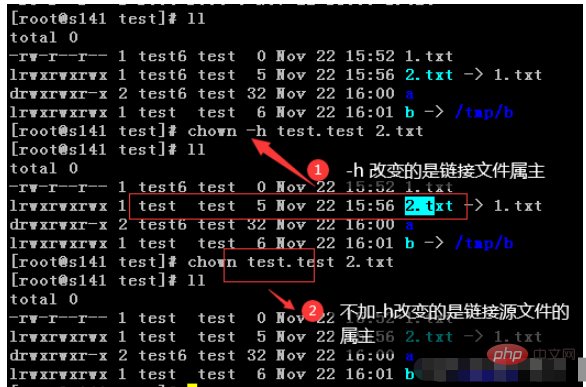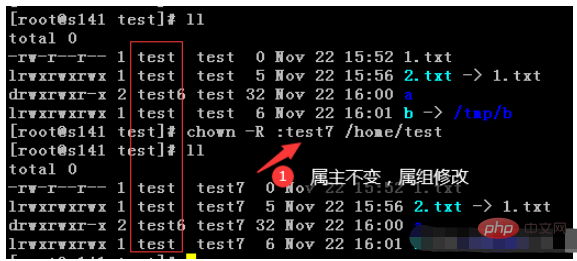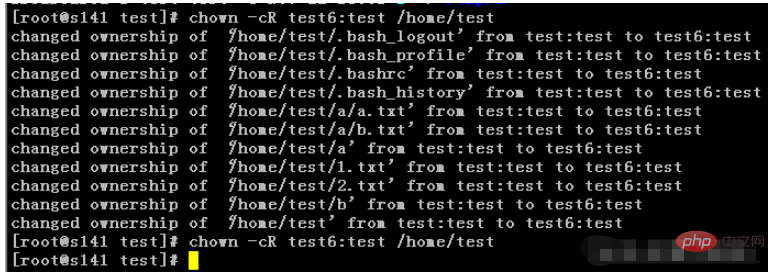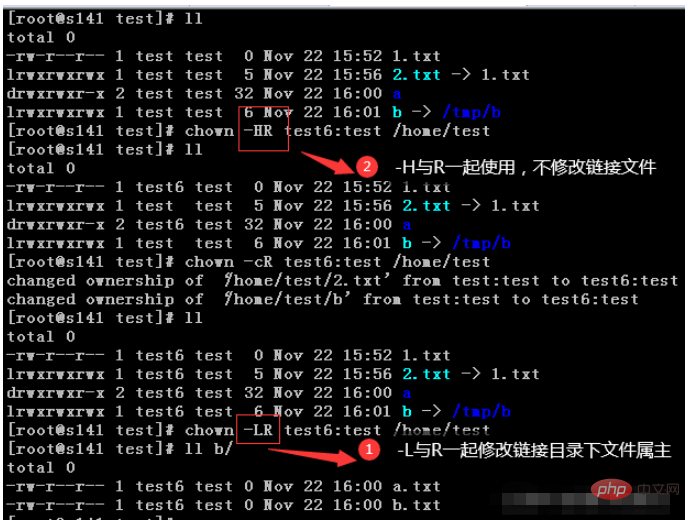How to use Linux chown command
1. Command introduction
The Linux chown (English full spelling: change owner) command is used to set the file owner and file association group. chown requires the permissions of the super user root to execute this command. chown changes the user and/or group ownership of each given file. If only the owner (username or numeric user ID) is provided, that user becomes the owner of each given file and the file group is not changed. If the owner is followed by a colon and the group name (or numeric group ID) with no space in between, the file's group ownership also changes. If the username is followed by a colon but no group name, that user becomes the owner of the file and the file's group is changed to that user's login group. If the colon and group are given but the owner is omitted, only the file group is changed; in this case, chown performs the same function as chgrp. If only a colon is given, or if the entire operand is empty, the owner or group has changed.
2. Usage examples
1. Get command help
[root@s141 home]# chown --help
2. Check the command version
[root@s141 home]# chown --version
chown (GNU coreutils) 8.22
Copyright © 2013 Free Software Foundation, Inc.
License GPLv3 : GNU GPL version 3 or later http://gnu.org/licenses/gpl.html.
This is free software: you are free to change and redistribute it.
There is NO WARRANTY, to the extent permitted by law.
Written by David MacKenzie and Jim Meyering.
3. Modify the file owner and group
[root@s141 test]# touch 1.txt
[root@s141 test]# ll
total 0
-rw-r–r-- 1 root root 0 Nov 22 15:52 1.txt
drwxrwxr -x 2 test test 6 Nov 21 18:24 a
[root@s141 test]# chown test.test 1.txt
[root@s141 test]# ll
total 0
-rw- r–r-- 1 test test 0 Nov 22 15:52 1.txt
drwxrwxr-x 2 test test 6 Nov 21 18:24 a
4. Recursively modify the owner of the entire directory Group

5. Modify the link owner and group




Usage: chown [parameter] user[:group] file2. Parameter description
| Parameter description | |
|---|---|
| New The user ID of the file owner | |
| The user group (group) of the new file owner | |
| Display information about changed parts | |
| Ignore error messages | |
| Fix symbolic links | |
| Display detailed processing information | |
| Process all files in the specified directory and its subdirectories | |
| Display auxiliary instructions | |
| Display version |
- -H If the command line argument is a symbolic link pointing to a directory, iterate over it
- -L Iterate over each pointing directory encountered Symbolic links
- -P Do not traverse any symbolic links (default)
The above is the detailed content of How to use Linux chown command. For more information, please follow other related articles on the PHP Chinese website!

Hot AI Tools

Undresser.AI Undress
AI-powered app for creating realistic nude photos

AI Clothes Remover
Online AI tool for removing clothes from photos.

Undress AI Tool
Undress images for free

Clothoff.io
AI clothes remover

Video Face Swap
Swap faces in any video effortlessly with our completely free AI face swap tool!

Hot Article

Hot Tools

Notepad++7.3.1
Easy-to-use and free code editor

SublimeText3 Chinese version
Chinese version, very easy to use

Zend Studio 13.0.1
Powerful PHP integrated development environment

Dreamweaver CS6
Visual web development tools

SublimeText3 Mac version
God-level code editing software (SublimeText3)

Hot Topics
 What computer configuration is required for vscode
Apr 15, 2025 pm 09:48 PM
What computer configuration is required for vscode
Apr 15, 2025 pm 09:48 PM
VS Code system requirements: Operating system: Windows 10 and above, macOS 10.12 and above, Linux distribution processor: minimum 1.6 GHz, recommended 2.0 GHz and above memory: minimum 512 MB, recommended 4 GB and above storage space: minimum 250 MB, recommended 1 GB and above other requirements: stable network connection, Xorg/Wayland (Linux)
 Linux Architecture: Unveiling the 5 Basic Components
Apr 20, 2025 am 12:04 AM
Linux Architecture: Unveiling the 5 Basic Components
Apr 20, 2025 am 12:04 AM
The five basic components of the Linux system are: 1. Kernel, 2. System library, 3. System utilities, 4. Graphical user interface, 5. Applications. The kernel manages hardware resources, the system library provides precompiled functions, system utilities are used for system management, the GUI provides visual interaction, and applications use these components to implement functions.
 How to run java code in notepad
Apr 16, 2025 pm 07:39 PM
How to run java code in notepad
Apr 16, 2025 pm 07:39 PM
Although Notepad cannot run Java code directly, it can be achieved by using other tools: using the command line compiler (javac) to generate a bytecode file (filename.class). Use the Java interpreter (java) to interpret bytecode, execute the code, and output the result.
 vscode cannot install extension
Apr 15, 2025 pm 07:18 PM
vscode cannot install extension
Apr 15, 2025 pm 07:18 PM
The reasons for the installation of VS Code extensions may be: network instability, insufficient permissions, system compatibility issues, VS Code version is too old, antivirus software or firewall interference. By checking network connections, permissions, log files, updating VS Code, disabling security software, and restarting VS Code or computers, you can gradually troubleshoot and resolve issues.
 vscode terminal usage tutorial
Apr 15, 2025 pm 10:09 PM
vscode terminal usage tutorial
Apr 15, 2025 pm 10:09 PM
vscode built-in terminal is a development tool that allows running commands and scripts within the editor to simplify the development process. How to use vscode terminal: Open the terminal with the shortcut key (Ctrl/Cmd). Enter a command or run the script. Use hotkeys (such as Ctrl L to clear the terminal). Change the working directory (such as the cd command). Advanced features include debug mode, automatic code snippet completion, and interactive command history.
 How to check the warehouse address of git
Apr 17, 2025 pm 01:54 PM
How to check the warehouse address of git
Apr 17, 2025 pm 01:54 PM
To view the Git repository address, perform the following steps: 1. Open the command line and navigate to the repository directory; 2. Run the "git remote -v" command; 3. View the repository name in the output and its corresponding address.
 Where to write code in vscode
Apr 15, 2025 pm 09:54 PM
Where to write code in vscode
Apr 15, 2025 pm 09:54 PM
Writing code in Visual Studio Code (VSCode) is simple and easy to use. Just install VSCode, create a project, select a language, create a file, write code, save and run it. The advantages of VSCode include cross-platform, free and open source, powerful features, rich extensions, and lightweight and fast.
 Can vscode be used for mac
Apr 15, 2025 pm 07:36 PM
Can vscode be used for mac
Apr 15, 2025 pm 07:36 PM
VS Code is available on Mac. It has powerful extensions, Git integration, terminal and debugger, and also offers a wealth of setup options. However, for particularly large projects or highly professional development, VS Code may have performance or functional limitations.






